 Police Sergeant
Exam
Police Sergeant
Exam
Here are the textbooks you should use to prepare for your police sergeant test in a police or sheriff's department. Police Promotion exams with up to 500+ questions, from 150+ great textbooks, are now available.
Here is our current list of all 150+ police promotion exams
What are the best textbooks to study to prepare for your police sergeant promotion exam?
Which textbook is chosen for your agency's sergeant and corporal promotion exams depends on whether you are working for a large agency (150+ sworn) or a medium agency (50 - 150 sworn) or a small agency (under 50 sworn) or a very small agency (10 officers or fewer). You will also need to use your judgment and knowledge of how the rank of sergeant is considered and structured in your specific agency; is it considered strictly a supervisory rank, or if in a very small agency, say 10 officers or less, as an executive manager, i.e. assistant or deputy chief? The biggest difference being, of course, as an executive you need to be able to step in to lead your agency at any moment, so the demands in education are much higher.
Here is a list of supervision textbooks which typically appear on a police promotion exam for the rank of Sergeant. Exams for each are available in our testing center.
Basic Handbook of Police Supervision
Challenging the Law Enforcement Organization
Character and Cops: Ethics in Policing
Common Sense Police Supervision
Effective Police Leadership - Moving Beyond Management
Effective Police Supervision - More and Miller
High-Risk Patrol
Leadership and Management in Police Organizations
Management and Supervision in Law Enforcement - Hess and Orthmann
Police Field Operations - Adams
Police Field Operations Theory Meets Practice
Police Patrol Operations and Management
Supervising Police Personnel Strengths Based Leadership
Supervision of Police Personnel
The Power Manual - A Step-by-Step Guide to Improving Police Officer Wellness
Police Promotional Exams with thousands of sergeant promotion questions and police sergeant questions and answers are available for any or all of the great textbooks listed on this page, and can be taken by you to use as study material within the Advanced Police Promotional Testing Course at PoliceCareer.com. We have THOUSANDS of police sergeant questions broken up by the textbooks you are studying.


Try a few short, sample exams and online flashcards - at no cost. You'll receive an email with your login in the next few minutes. Then learn more about our exams and download our expert study system.

In my own career I rose to the rank of lieutenant in a medium size agency with just under 100 officers. While lieutenant is normally not considered upper management or executive rank, lieutenant in our agency became the third in command because of a flattened organizational structure. We had eliminated the ranks of captain and major and expanded the pay and duties of lieutenants, and cut the executive rank structure to be only one deputy chief and a chief of police. A second deputy chief, technically a major's rank and position, was also eliminated. So, I was in a special spot - as the senior lieutenant - I was a division commander, but in the absence of the deputy chief or chief or both, as the senior lieutenant I was expected to fill in as acting deputy chief and even acting chief of police, which I did on numerous occasions.
Also in my agency, because of this flattening of the organization and shifting of responsibilities, the sergeant rank also rose in responsibilities, performing many of the mid-management tasks previously performed by lieutenants, including acting as the watch commander on many shifts.
These are the 12+ supervision textbooks that clearly stand above the rest for a police sergeant promotional exam. I have written numerous exams from for the ranks of both sergeant and lieutenant from each of them, but you will see them most often in use for the police sergeant exam. Any of them can be used in a small, medium or large agency, since they each contain a comprehensive summary of supervisory, management, administration and leadership principles.
Also, besides those below, you should consider adding books to your police sergeant exam reading list that cover the areas of COP/POP, Criminal Investigation, Leadership, Intelligence-led Policing, Ethics and also national and state legal titles.
Here are the questions we most hear from our police sergeant promotion testing clients, with our responses:
What are the most common police sergeant questions?
How long is the police sergeant exam?
How do I study for a sergeant exam?
How do I prepare for a police sergeant interview?
What is on the detective exam?
How do police officers get promoted to detective?
Is a police sergeant higher than a detective?
Responses:
What are the most common police sergeant questions?
We have a list of over 2,000+ police sergeant questions, broken up between all the textbooks shown below on this page.
How long is the police sergeant exam?
Great question! We write exams for agencies also through our site PolicePromotion.com so we know the answer - it would be a minimum of 1 hour, but as many as 3 hours for the written exam, especially if essay and scenario written promotion test questions are used. We think 2 hours is about the average your sergeant's promotional exam should last.
How do I study for a Sergeant exam?
We have been in business since 1985, and we have developed a unique and highly successful study method that applies to your police sergeant exam - The 10-Steps to Written Exam Mastery.
How do I prepare for a police sergeant interview?
There is only one proven way to be assured you are the best prepared of all the candidates for a police sergeant interview, and that is to use the Oral Boards Made Easy(tm) system of our affiliate, Assistant Chief (ret) Bill Reilly of Finests.com.
What is on the detective exam?
We have a whole page of resources and information so you can see for yourself what is on the detective exam. We write police promotion exams for detective from all of the books on this page, they are all top-notch textbooks to study and to keep handy in your personal library as a reference source for your detective career!
How do police officers get promoted to detective?
In many police agencies, detective - or investigator - is an assignment and not a promotion. Usually in larger agencies, detective becomes a specialty and is considered a promotion that the agency will give a promotion exam for. Then from there you can take an exam for Detective Sergeant and Detective Lieutenant and in very large agencies, Detective Commander and Chief of Detectives.
Is a police sergeant higher than a detective?
This very much depends on the agency and its size and budget. If the agency has a rank structure that includes Corporal, often Detective or Investigator is equal to that rank. In most medium and large agencies, a Detective Sergeant, Detective Lieutenant and higher are assigned to the Detective Division, and the rank of Detective will then likely be equal to either an officer or at most the corporal rank. Some agencies also designate micro-ranks, such as Career Officer, or Officer I, II and III, or in the case of Sheriff's Departments it would be Deputy I, II, or III or Career Deputy. These micro-ranks usually fall just below the sergeant level in the agency.
I need a list of the most common police sergeant questions and answers, does your company provide these?
Yes, we do. We cover police sergeant questions and answers from dozens of professional law enforcement sergeant exam textbooks, but also our affiliate Finests.com has videos demonstrating the most common police sergeant questions and answers found on police sergeant oral boards.
My BEST piece of advice on this page? If you believe you are heading to a police sergeant promotional exam any time in the future, if you are looking for a great police supervision and management study guide, you need to own and constantly read the material in the below textbooks.
Here is what you just said out loud, "All these textbooks! Oh, hell! No way! Way too expensive!"
No, "way too expensive" is what happens when you don't start with your first promotion to corporal or sergeant, so of course you then cannot climb further up the ranks, and so you will leave $250K - $500K+ in a lifetime of pay and pension and benefits behind on the table - all because you did not make the first step. That is "expensive" - NOT the thousand dollars or so for these textbooks. If you can't buy them - rent them and read them, one at a time.
I finally got that off my chest. These books for police sergeant promotional exams are not listed in any particular order. We have thousands of sergeant promotion questions available for study from these great textbooks.
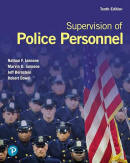 Supervision
of Police Personnel - Iannone -
now in its 10th edition. 470+ questions. From me; The most-used police supervision
textbook used for the
police
sergeant exam, and with very good reason - it
is the best all-around, thorough and balanced presentation on all
the topics the new supervisor is going to need. Is also used mostly
for a police sergeant promotional exam, but also in
promotional exams for lieutenant, especially in large agencies where
the lieutenant is more street than office oriented. Try free some
Supervision of Police Personnel test questions.
Supervision
of Police Personnel - Iannone -
now in its 10th edition. 470+ questions. From me; The most-used police supervision
textbook used for the
police
sergeant exam, and with very good reason - it
is the best all-around, thorough and balanced presentation on all
the topics the new supervisor is going to need. Is also used mostly
for a police sergeant promotional exam, but also in
promotional exams for lieutenant, especially in large agencies where
the lieutenant is more street than office oriented. Try free some
Supervision of Police Personnel test questions.From the publisher; Supervision of Police Personnel offers complete coverage of the principles and practices of police supervision for leadership training of supervisors in law enforcement and allied fields. This newly updated text includes new chapters on legal concepts and consequences for police supervisors, an also explores new management topics impacting the profession. The text continues to explore relationships involved in individual and group management methods and the practical techniques for carrying out the various responsibilities of the police supervisor. Discussions focus on real issues faced by police supervisors in interpersonal, operational, and administrative relationships. Written by experienced police officers as well as researchers, Supervision of Police Personnel continues to present time-tested content that is an indispensible resource for promotional exams. Visit us for the Supervision of Police Personnel exam, test questions, study guide and flashcards. We have online police sergeant promotional exams from this textbook for the 6th, 7th, 8th, 9th and 10th editions. You can also sign up to try the Supervision of Police Personnel test questions as well as the full online exam and the smartphone-friendly online Supervision of Police Personnel flashcards.
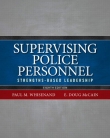 Supervising
Police Personnel - Strengths-Based Leadership - by
Whisenand. From me; The Supervising Police Personnel study
guide and the promotion exam is often requested and used
extensively for study, and for very good reason. This is another long-standing and excellent choice for
a police sergeant promotional exam. The new 8th edition features all new
material focused on leadership traits needed in the new supervisor.
Use our promotion exam along with our study guide for this title to
really prepare yourself for a police Sgt. promotion!
Supervising
Police Personnel - Strengths-Based Leadership - by
Whisenand. From me; The Supervising Police Personnel study
guide and the promotion exam is often requested and used
extensively for study, and for very good reason. This is another long-standing and excellent choice for
a police sergeant promotional exam. The new 8th edition features all new
material focused on leadership traits needed in the new supervisor.
Use our promotion exam along with our study guide for this title to
really prepare yourself for a police Sgt. promotion!From the publisher; Using an interactive, three-part structure, Supervising Police Personnel: Strengths-Based Leadership covers all the latest supervisory concepts and practices–and emphasizes character, values and strengths-based leadership throughout. It tackles issues such as leadership, ethics, communications, training, evaluations, empowerment and problem-oriented policing– uniquely combining the human factor with the performance edge. The new edition is broken into six leadership strengths: Character, Clarity, Empowerment, Well-Being, Self-Control, and Teamwork. Along with this new design come two entirely new chapters: Happiness and Willpower. All of the chapters have been updated with new trends, facts, and exercises. Visit us for the Supervising Police Personnel study guide and the promotion exam, test questions, answers, and the printed and online flashcards.
 Challenging
the Law Enforcement Organization - Proactive Leadership Strategies by
Jack Enter, Ph.D.
Great book. Well written, no jargon. Short enough but not too short.
You should read it, then put it down for a month or two, then read
it again. Great choice for a police sergeant promotional exam. From the publisher; Among the topics discussed are
chapters on the impact of living and policing an unskilled and
violent society, why law enforcement managers fail to successfully
impact their agencies, and chapters on self-management,
communication, motivation, and being more effective in our personal
lives. Many of these latter “strategy” chapters have examples of
proactive techniques used by law enforcement managers as well as
“action items” to apply the principles examined in each chapter.
Visit us for the
Challenging the Law Enforcement Organization exam, test questions,
study guide and flashcards.
Challenging
the Law Enforcement Organization - Proactive Leadership Strategies by
Jack Enter, Ph.D.
Great book. Well written, no jargon. Short enough but not too short.
You should read it, then put it down for a month or two, then read
it again. Great choice for a police sergeant promotional exam. From the publisher; Among the topics discussed are
chapters on the impact of living and policing an unskilled and
violent society, why law enforcement managers fail to successfully
impact their agencies, and chapters on self-management,
communication, motivation, and being more effective in our personal
lives. Many of these latter “strategy” chapters have examples of
proactive techniques used by law enforcement managers as well as
“action items” to apply the principles examined in each chapter.
Visit us for the
Challenging the Law Enforcement Organization exam, test questions,
study guide and flashcards.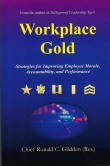 From
me: Great book! Light on theory, heavy on practical application.
From the publisher: With Workplace
Gold -
Chief Ronald C. Glidden (Ret.) has written a strategy-filled
resource for both new and experienced supervisors. He gives
supervisors and managers at every level the tools they need to earn
employee trust and commitment while giving them practical easy to
follow steps to get the best performance results from their
employees. From building trust to requiring accountability; from
communicating clearly to giving recognition; Workplace Gold contains
invaluable and practical leadership strategies that supervisors and
managers can use every day.
Visit us today
for a Workplace Gold promotion exam, test questions, study guide and
flash card sets.
From
me: Great book! Light on theory, heavy on practical application.
From the publisher: With Workplace
Gold -
Chief Ronald C. Glidden (Ret.) has written a strategy-filled
resource for both new and experienced supervisors. He gives
supervisors and managers at every level the tools they need to earn
employee trust and commitment while giving them practical easy to
follow steps to get the best performance results from their
employees. From building trust to requiring accountability; from
communicating clearly to giving recognition; Workplace Gold contains
invaluable and practical leadership strategies that supervisors and
managers can use every day.
Visit us today
for a Workplace Gold promotion exam, test questions, study guide and
flash card sets. 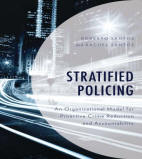 Stratified
Policing: An Organizational Model for Proactive Crime Reduction and
Accountability
Stratified
Policing: An Organizational Model for Proactive Crime Reduction and
Accountability From the Publisher: Implementing effective crime reduction requires deliberate thought and effort to integrate processes into the police organization, its culture, and the day-to-day work. Provides police leaders a clear path for institutionalization of crime reduction modeled after current police processes. It sets up an organization to more easily incorporate evidence-based strategies into everyday operations with the goal of changing a police organization from reactive to proactive.
From me: Groundbreaking - EXCELLENT work. Very focused, well researched, and clearly presented roadmap for agencies of all sizes to achieve crime reduction WITHOUT changing their agency size or rank structure. This textbook is a great choice for Sergeant - Lieutenant and Captain promotions. Our exam has 200+ questions.
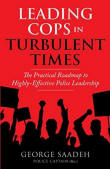 Leading
Cops in Turbulent Times by
Capt (ret) George Saadeh.
From me; Excellent new leadership and management title.
Well-researched timely perspective on police leadership. Now being
used in police sergeant, lieutenant, captain and upper management
exams. From the publisher; Leading Cops in Turbulent Times is a
clear roadmap to building high-performing organizations and teams
for current or aspiring public safety leaders. Whether you're a
police sergeant, lieutenant, captain or even Chief or Sheriff, this
book will help you build or improve the hard and soft skills that
are essential to great leadership. It is replete with practical,
common-sense advice and examples from historical figures and
contemporary leaders that will crystalize in your mind how to build
or improve your leadership skills.
Visit us for the
Leading Cops
in Turbulent Times exam, test questions, study guide and flashcards.
Leading
Cops in Turbulent Times by
Capt (ret) George Saadeh.
From me; Excellent new leadership and management title.
Well-researched timely perspective on police leadership. Now being
used in police sergeant, lieutenant, captain and upper management
exams. From the publisher; Leading Cops in Turbulent Times is a
clear roadmap to building high-performing organizations and teams
for current or aspiring public safety leaders. Whether you're a
police sergeant, lieutenant, captain or even Chief or Sheriff, this
book will help you build or improve the hard and soft skills that
are essential to great leadership. It is replete with practical,
common-sense advice and examples from historical figures and
contemporary leaders that will crystalize in your mind how to build
or improve your leadership skills.
Visit us for the
Leading Cops
in Turbulent Times exam, test questions, study guide and flashcards.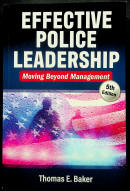 Effective
Police Leadership - Moving Beyond Management, by Thomas E.
Baker. From me; A very important leadership book I
have used often to write a
police
sergeant exam. From the publisher; In this much-anticipated
5th Edition, Tom Baker
expands on the revolutionary leadership insights that made his first
two editions so popular. This enhanced and expanded version explores
even more strategies that help agencies, administrators and officers
leverage crime data more efficiently and effectively. From
explaining what a leader must be, do & know, to plans for putting
expert-level leadership skills to work immediately, Effective Police
Leadership is gold for law enforcement leaders. Great leaders aren't
born, they're made...and this book makes them! Visit us for the
Effective Police Leadership exam, test questions, study guide and
flashcards.
Effective
Police Leadership - Moving Beyond Management, by Thomas E.
Baker. From me; A very important leadership book I
have used often to write a
police
sergeant exam. From the publisher; In this much-anticipated
5th Edition, Tom Baker
expands on the revolutionary leadership insights that made his first
two editions so popular. This enhanced and expanded version explores
even more strategies that help agencies, administrators and officers
leverage crime data more efficiently and effectively. From
explaining what a leader must be, do & know, to plans for putting
expert-level leadership skills to work immediately, Effective Police
Leadership is gold for law enforcement leaders. Great leaders aren't
born, they're made...and this book makes them! Visit us for the
Effective Police Leadership exam, test questions, study guide and
flashcards.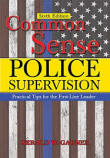 Common
Sense Police Supervision: Practical Tips for the First-Line Leader -
Gerald W. Garner. From me; I like this book a lot for new
supervisors. It is very well written, and in plain language. I have
written many corporal and sergeant exams using this textbook going
back to its very first edition. It covers all the material a new
supervisor needs, and gives them a good outlook on what lies ahead
- such as all their former comrades pushing their limits and
stopping conversations mid-sentence when you walk into the briefing
room.
Common
Sense Police Supervision: Practical Tips for the First-Line Leader -
Gerald W. Garner. From me; I like this book a lot for new
supervisors. It is very well written, and in plain language. I have
written many corporal and sergeant exams using this textbook going
back to its very first edition. It covers all the material a new
supervisor needs, and gives them a good outlook on what lies ahead
- such as all their former comrades pushing their limits and
stopping conversations mid-sentence when you walk into the briefing
room. From the publisher; The purpose of this sixth edition is to stimulate the veteran, novice, or would-be police supervisor to utilize his or her most powerful tool, common sense, in carrying out the duties of an effective leader. Made up of life experience, good judgment, prudence, and a well-developed ability for solid reasoning and logical decision making, common sense will guide the intelligent supervisor in finding effective solutions to most of the problems he or she will encounter while leading police personnel. Visit us for the Common Sense Police Supervision exam, test questions, study guide and flashcards.
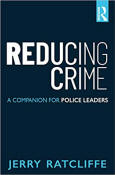 Reducing
Crime - a Companion for Police Leaders - 1st Edition by Jerry
Ratcliffe. This is a very detailed and well researched but easy to
read treatment of modern crime control strategies surrounding the
concept of Intelligence-led and evidence-based policing. Great
choice for Sergeant, Lieutenant, Captain and upper-management
promotion exams. Visit us for the
Reducing
Crime - A Companion for Police Leaders 1st Edition exam, test
questions, study guide and flashcards.
Reducing
Crime - a Companion for Police Leaders - 1st Edition by Jerry
Ratcliffe. This is a very detailed and well researched but easy to
read treatment of modern crime control strategies surrounding the
concept of Intelligence-led and evidence-based policing. Great
choice for Sergeant, Lieutenant, Captain and upper-management
promotion exams. Visit us for the
Reducing
Crime - A Companion for Police Leaders 1st Edition exam, test
questions, study guide and flashcards.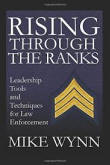 Rising
Through The Ranks - Leadership Tools and Techniques for Law
Enforcement. From
the Author and Publisher: Effective leadership is a journey, not a
destination. Rising through the Ranks will be the starting point in
that journey for thousands of men and women in law enforcement.
Telling real stories of leadership and courage from police
departments and investigative agencies, former DEA Leadership Fellow
and Pittsfield, Massachusetts Police Chief Mike Wynn is the perfect
author. As the only book of its kind, Rising through the Ranks will
prepare effective leaders from local police officers to federal
agents. From me: This is a short but very descriptive and
hard-hitting book on leadership and courage in the face of
adversity. Very good choice for promotion "through the ranks" from
corporal through captain.
Rising
Through the Ranks promotion exam, test questions, study guide and
flashcards.
Rising
Through The Ranks - Leadership Tools and Techniques for Law
Enforcement. From
the Author and Publisher: Effective leadership is a journey, not a
destination. Rising through the Ranks will be the starting point in
that journey for thousands of men and women in law enforcement.
Telling real stories of leadership and courage from police
departments and investigative agencies, former DEA Leadership Fellow
and Pittsfield, Massachusetts Police Chief Mike Wynn is the perfect
author. As the only book of its kind, Rising through the Ranks will
prepare effective leaders from local police officers to federal
agents. From me: This is a short but very descriptive and
hard-hitting book on leadership and courage in the face of
adversity. Very good choice for promotion "through the ranks" from
corporal through captain.
Rising
Through the Ranks promotion exam, test questions, study guide and
flashcards.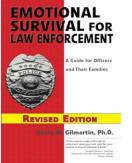 Emotional
Survival for Law Enforcement - A Guide for Officers and Their
Families - 1st Edition AND 2021 Update - From me: This excellent textbook is often used
in police corporal, sergeant and lieutenant exams. I see it
most used for the police Sgt. exam in large agencies. This
title should be required reading in all law enforcement agencies and
in all police academies, with copies for each police family member.
From the publisher; Dr. Gilmartin is a behavioral scientist who
specializes in issues related to law enforcement. With twenty years
of police experience under his belt, he currently provides service
to the law enforcement community as a consultant. In writing this
book, it was his goal to aid officers and their families in
maintaining and/or improving their quality of life both personally
and professionally.
Emotional
Survival for Law Enforcement exam, test questions, study guide and
flashcards.
Emotional
Survival for Law Enforcement - A Guide for Officers and Their
Families - 1st Edition AND 2021 Update - From me: This excellent textbook is often used
in police corporal, sergeant and lieutenant exams. I see it
most used for the police Sgt. exam in large agencies. This
title should be required reading in all law enforcement agencies and
in all police academies, with copies for each police family member.
From the publisher; Dr. Gilmartin is a behavioral scientist who
specializes in issues related to law enforcement. With twenty years
of police experience under his belt, he currently provides service
to the law enforcement community as a consultant. In writing this
book, it was his goal to aid officers and their families in
maintaining and/or improving their quality of life both personally
and professionally.
Emotional
Survival for Law Enforcement exam, test questions, study guide and
flashcards.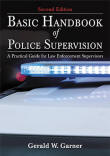 Basic
Handbook of Police Supervision: A Practical Guide for Law
Enforcement Supervisors - Gerald W. Garner. Now in its 2nd
edition. From me; This is an
excellent textbook to use for a police corporal exam in any agency,
or police sergeant exam for small to medium agencies. It does what
its title implies- it covers all the basics. It sticks to the theme
of basic, common-sense and tried-and-true supervisory methods, not
delving too deeply into theory or covering advanced supervisory
practices. From the publisher: This handbook provides reliable
guidance on what to do next and offers practical, no-frills advice
about what to do to counter the day-to-day challenges and outright
calamities that make up the first-line leader's work life. Perhaps
even more important, it offers time-proven recommendations on how to
prevent a bothersome situation from escalating into crisis
proportions in the first place. It will prove equally useful to the
veteran, novice or future law enforcement supervisor. Its sound
advice will help him retain his emotional as well as physical and
moral health in a real-world environment that seems to become more
challenging every day. It will help him to lead and bring his people
to share his practices and beliefs in doing a very critical job the
right way. Visit us for the
Basic Handbook of Police Supervision exam, test questions, study
guide and flashcards.
Basic
Handbook of Police Supervision: A Practical Guide for Law
Enforcement Supervisors - Gerald W. Garner. Now in its 2nd
edition. From me; This is an
excellent textbook to use for a police corporal exam in any agency,
or police sergeant exam for small to medium agencies. It does what
its title implies- it covers all the basics. It sticks to the theme
of basic, common-sense and tried-and-true supervisory methods, not
delving too deeply into theory or covering advanced supervisory
practices. From the publisher: This handbook provides reliable
guidance on what to do next and offers practical, no-frills advice
about what to do to counter the day-to-day challenges and outright
calamities that make up the first-line leader's work life. Perhaps
even more important, it offers time-proven recommendations on how to
prevent a bothersome situation from escalating into crisis
proportions in the first place. It will prove equally useful to the
veteran, novice or future law enforcement supervisor. Its sound
advice will help him retain his emotional as well as physical and
moral health in a real-world environment that seems to become more
challenging every day. It will help him to lead and bring his people
to share his practices and beliefs in doing a very critical job the
right way. Visit us for the
Basic Handbook of Police Supervision exam, test questions, study
guide and flashcards.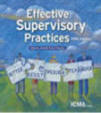 Effective
Supervisory Practices - Better Results Through Teamwork - 5th
Edition - ICMA Press -
From me; I like this book a lot for new supervisors, although it is
not written specifically for law enforcement or by law enforcement
professionals. Instead, it is written for government workers to
include law enforcement, fire service, and all other municipal and
county departments. It is well written, in plain language, with a
lot of illustrations. It covers all the material a new supervisor
needs, in a simple to follow and understand format. It places a
heavy emphasis on customer service and problem solving in the
workplace. This textbook is a great choice for a police sgt
exam.
Effective
Supervisory Practices - Better Results Through Teamwork - 5th
Edition - ICMA Press -
From me; I like this book a lot for new supervisors, although it is
not written specifically for law enforcement or by law enforcement
professionals. Instead, it is written for government workers to
include law enforcement, fire service, and all other municipal and
county departments. It is well written, in plain language, with a
lot of illustrations. It covers all the material a new supervisor
needs, in a simple to follow and understand format. It places a
heavy emphasis on customer service and problem solving in the
workplace. This textbook is a great choice for a police sgt
exam.From the publisher; ICMA’s newest edition of its best-selling Effective Supervisory Practices: Better Results through Teamwork gives today’s managers and supervisors a powerful tool for understanding the many dimensions of the supervisory role and their impact on helping to improve productivity, implement quality management, and build an effective work team. Visit us for the Effective Supervisory Practices exam, test questions, study guide and flashcards.
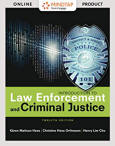 Introduction
to Law Enforcement and Criminal Justice -
by Hess, Orthmann and Cho. From me; This is a 600+ page work which
covers all law enforcement topics and is a popular choice for police
corporal and sergeant exams. Very thorough, very well written, and
very well organized. EVERYTHING is covered, and in good detail. It
is a lot to take in, and it may be viewed unusual to assign this
book along with others to also study for a sergeant promotion.
Usually, agency clients can eliminate the chapters on courts and
corrections, bringing the study material down to "only" 500 pages.
In a nutshell, this textbook is a great choice for a police
sgt exam.
Introduction
to Law Enforcement and Criminal Justice -
by Hess, Orthmann and Cho. From me; This is a 600+ page work which
covers all law enforcement topics and is a popular choice for police
corporal and sergeant exams. Very thorough, very well written, and
very well organized. EVERYTHING is covered, and in good detail. It
is a lot to take in, and it may be viewed unusual to assign this
book along with others to also study for a sergeant promotion.
Usually, agency clients can eliminate the chapters on courts and
corrections, bringing the study material down to "only" 500 pages.
In a nutshell, this textbook is a great choice for a police
sgt exam.From the publisher; Fully updated to reflect the latest changes in the field, this new edition provides comprehensive, practical coverage of both law enforcement and the criminal justice system as a whole (including courts, corrections, and juvenile justice) in one convenient volume. Acclaimed for its uniquely accessible writing style, many real-world examples, and its realistic and relevant "boots on the street" perspective, this new edition is packed with up-to-date information on today's hottest topics. These include the numerous ways technology is changing the day-to-day operations of policing; the recommendations of the President's Task Force on 21st Century Policing, including the need to improve trust and legitimacy with the public and a shift to a guardian mindset; the law enforcement response to new terrorism threats such as ISIS and homegrown violent extremists, the consequences of Brady-Giglio violations, and more. Visit us for the Introduction to Law Enforcement and Criminal Justice exam, test questions, study guide and flashcards.
 Police
Supervision and Management In An Era of Community Policing -
Peak - Gaines and Glensor. From me; Excellent book for a police
sergeant promotional exam, or to study for
career enhancement. Excellent coverage of
community and problem-oriented policing management and leadership
topics. From the publisher; Taking a
problem-solving approach, this book provides readers with an
insider’s view of the challenging and demanding world of the police
supervisor or manager. Aimed at first-line supervisors and mid-level
managers, it covers basic human resource responsibilities (training
and evaluating officers, officer rights, etc.) and day-to-day tasks
(deploying and scheduling, responses to crime problems, etc.). This
edition includes new chapters on union and labor relations, police
operations and homeland security. Throughout, case studies get
readers thinking about the issues and exhibits show what some
jurisdictions are doing to address problems of crime and disorder.
Visit us for the
Police Supervision and Management In An Era of Community Policing
exam, test questions, study guide and flashcards.
Police
Supervision and Management In An Era of Community Policing -
Peak - Gaines and Glensor. From me; Excellent book for a police
sergeant promotional exam, or to study for
career enhancement. Excellent coverage of
community and problem-oriented policing management and leadership
topics. From the publisher; Taking a
problem-solving approach, this book provides readers with an
insider’s view of the challenging and demanding world of the police
supervisor or manager. Aimed at first-line supervisors and mid-level
managers, it covers basic human resource responsibilities (training
and evaluating officers, officer rights, etc.) and day-to-day tasks
(deploying and scheduling, responses to crime problems, etc.). This
edition includes new chapters on union and labor relations, police
operations and homeland security. Throughout, case studies get
readers thinking about the issues and exhibits show what some
jurisdictions are doing to address problems of crime and disorder.
Visit us for the
Police Supervision and Management In An Era of Community Policing
exam, test questions, study guide and flashcards. Management
and Supervision of Law Enforcement Personnel - Lombardo and
Schroeder. From me; Not to be confused with a similar title
described below. People are always getting the two mixed up. This is
a very nuts-and-bolts direct and to the point book that is easy to
read and study, and the presentation is in the format where you can
take this supervisory and management knowledge and run with it
without hesitation.
Management
and Supervision of Law Enforcement Personnel - Lombardo and
Schroeder. From me; Not to be confused with a similar title
described below. People are always getting the two mixed up. This is
a very nuts-and-bolts direct and to the point book that is easy to
read and study, and the presentation is in the format where you can
take this supervisory and management knowledge and run with it
without hesitation.From the publisher; This title is a must read not only for anyone studying for promotion in law enforcement, but also for current managers/supervisors who would like to improve their on-the-job performance. Topics include principles associated with a police supervisor's or manager's role as a leader, planner, communicator, performance evaluator, trainer, disciplinarian, and human relations specialist. Visit us for the Management and Supervision of Law Enforcement Personnel exam, test questions, study guide and flashcards.
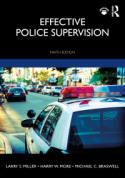 Effective
Police Supervision - More and Miller - now in its 9th edition.
From me; Excellent, comprehensive textbook. This exhaustive 500+ page work covers it all. I know many
agencies (especially medium to large agencies) that choose it for Lt as well as Sgt
promotion examinations.
Effective
Police Supervision - More and Miller - now in its 9th edition.
From me; Excellent, comprehensive textbook. This exhaustive 500+ page work covers it all. I know many
agencies (especially medium to large agencies) that choose it for Lt as well as Sgt
promotion examinations. From the publisher; Outstanding first-line supervisors are essential to the success of any law enforcement agency, yet many officers lack the supervision training necessary to excel. Effective Police Supervision immerses readers in the group behaviors and organizational dynamics supervisors must master in order to lead their teams and to help create an effective police department. Combining behavioral theory and updated case studies, this core text, now in its eighth edition, is a vital tool for all police officers preparing for promotional exams. Visit us for the Effective Police Supervision exam, test questions, study guide and flashcards.
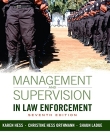 Management
and Supervision in Law Enforcement - Hess and Orthmann- From
me; I like this book for writing promotion exams and do it all the
time, and have written difficult and challenging exams way back to
the third edition. Now in it's 7th edition, this textbook is also
used in the New Jersey statewide civil service promotion exam for
Lt.
Management
and Supervision in Law Enforcement - Hess and Orthmann- From
me; I like this book for writing promotion exams and do it all the
time, and have written difficult and challenging exams way back to
the third edition. Now in it's 7th edition, this textbook is also
used in the New Jersey statewide civil service promotion exam for
Lt. From the publisher; a practical and straightforward book that focuses on law enforcement managers and supervisors, their jobs, and the complicated interrelationships between members of the law enforcement team and the communities they serve. The seventh edition begins with a general overview of the policing profession to provide context for later discussions of the role of managers within the field. Readers will learn about post-9/11 policing, research on the effects of 9/11, and the latest on data-driven policing, intelligence-led policing, evidence-based policing, and predictive policing. A new "Ethical Dilemma" boxed feature challenges readers to think critically about the moral issues faced by supervisors every day. This comprehensive overview of the responsibilities of law enforcement leaders, covering relevant topics ranging from the newest principles in policing to the exciting technological aids changing the face of law enforcement today, prepares readers to become tomorrow's leaders. Visit us for the Management and Supervision in Law Enforcement exam, test questions, study guide and flashcards.
Promotional Exams for any or all of these great textbooks can be taken by you to use as study material within the Advanced Police Promotional Testing Course at PoliceCareer.com. You can also practice with a police sample in-basket assessment.
Are YOU prepared to respond to these police sergeant oral board questions?
"How would YOU describe your knowledge and of police supervision and leadership?"
"How have you, or will you, apply this knowledge?"
"What do you feel MOST qualifies you to be promoted into this important department supervisory and leadership position?"
"This supervisory position is all about community and leadership. You are leading a team of department community police officers, reporting directly to management. Describe in detail your own philosophy of community and problem oriented policing, and how you are prepared to provide leadership in these areas on day one in your new rank."
Sign up for our police promotion newsletters. You will be able to take free promotion exams online to try out our system, including questions from Criminal Investigation textbooks, and also receive information on police oral boards, in-baskets and assessment centers.
Send me Exam and Assessment questions you have faced - one of the column features is that I will research and comment on written exam or assessment center questions you have heard, answered or encountered and that you are unsure or curious about, including any unusual in-basket items. We will be glad to give you our expert opinion on questions you have seen asked on exams and exercises. Send your questions to me directly - Paul@PoliceCareer.com.
The #1 BEST WAY to Prepare for Police Promotion Exams? Study the Textbooks!Patrol and Field Operations
Criminal Investigation
Community and Problem-oriented Policing - POP/COP
Police Ethics
Intelligence-Led Policing
Police Legal Textbooks - Law Officer's Pocket Manual and others
Police Leadership
Police Special Topics and Titles, such as below;

Police Corporal - Sergeant Lieutenant - Captain and Above Promotion Testing
Corporal Exam
Sergeant Exam
Lieutenant Exam
Captain Exam
Management and Administration Exams
Promotion Oral Boards (Detective, Corporal, Sergeant and above)
Promotion Assessment Centers (Sergeant and above)
Police Promotion In-Basket (Sergeant and above)
Advanced Police Promotion Testing Course
Study with hundreds more police sergeant test questions using the Advanced Police Promotion Testing Course at PoliceCareer.comSign up for our police promotion newsletters. You will be able to take free promotion exams online to try out our system, including questions from police sergeant textbooks, and also receive information on police oral boards, in-basket and assessment center topics.
Case Law Pro is the best method for officers to learn the law and prepare for upcoming exams and assessment center exercises!
CaseLawPro will improve your scores in promotional written exams, oral boards and assessment centers by studying hundreds of factual law enforcement scenarios, and identifying correct as well as incorrect responses to each one. Keep your legal skills sharp, updated and tested - ready for the next round of promotion exams and assessments!
Police Sergeant Promotion Test Questions
Police Sergeant Promotion Question 1;
The Supervisory Function "Assessment" comes under which of the 5
Supervisory Skill Areas?
(A) Leadership
(B) Knowledge
(C) Community
(D) Human
(E) Conceptual
Police Sergeant Promotion Question 2;
Successfully leading change at any level of the organization is
the result of
___________.
A innate behavior
B learned
behavior
C organizational motivators
D political mandates
Police Sergeant Promotion Question 3;
Outstanding supervisors have a significant attribute that
distinguishes them - it is
(A) leadership ability
(B) the
facility to communicate effectively
(C) the ability to carry
out orders
(D) the desire to motivate
Police Sergeant Promotion Question 4;
The study and theory by Herzberg that concerns "What do people
want from their job?" is called
(A) happiness - productivity
theory
(B) motivation - hygiene theory
(C) social - work
theory
(D) satisfaction - productivity theory
Police Sergeant Promotion Question 5;
Regarding significant beliefs within the police culture,
police believe that the war against crime can only be won by
(A) making the rules
(B) ignoring the rules
(C) following
the rules
(D) giving them a great deal of discretion
Supervisors should especially be aware of the theory of
__________, which addresses in particular the needs of adult
learners.
(A) argotsy
(B) epistemology
(C)
endocrinology
(D) andragogy
Police Sergeant Promotion Question 6;
Of the three styles of counseling listed below, which one has
the disadvantage of taking too much time for some situations?
(A) Combined
(B) Directive
(C) Nondirective
(D) none of
the above

